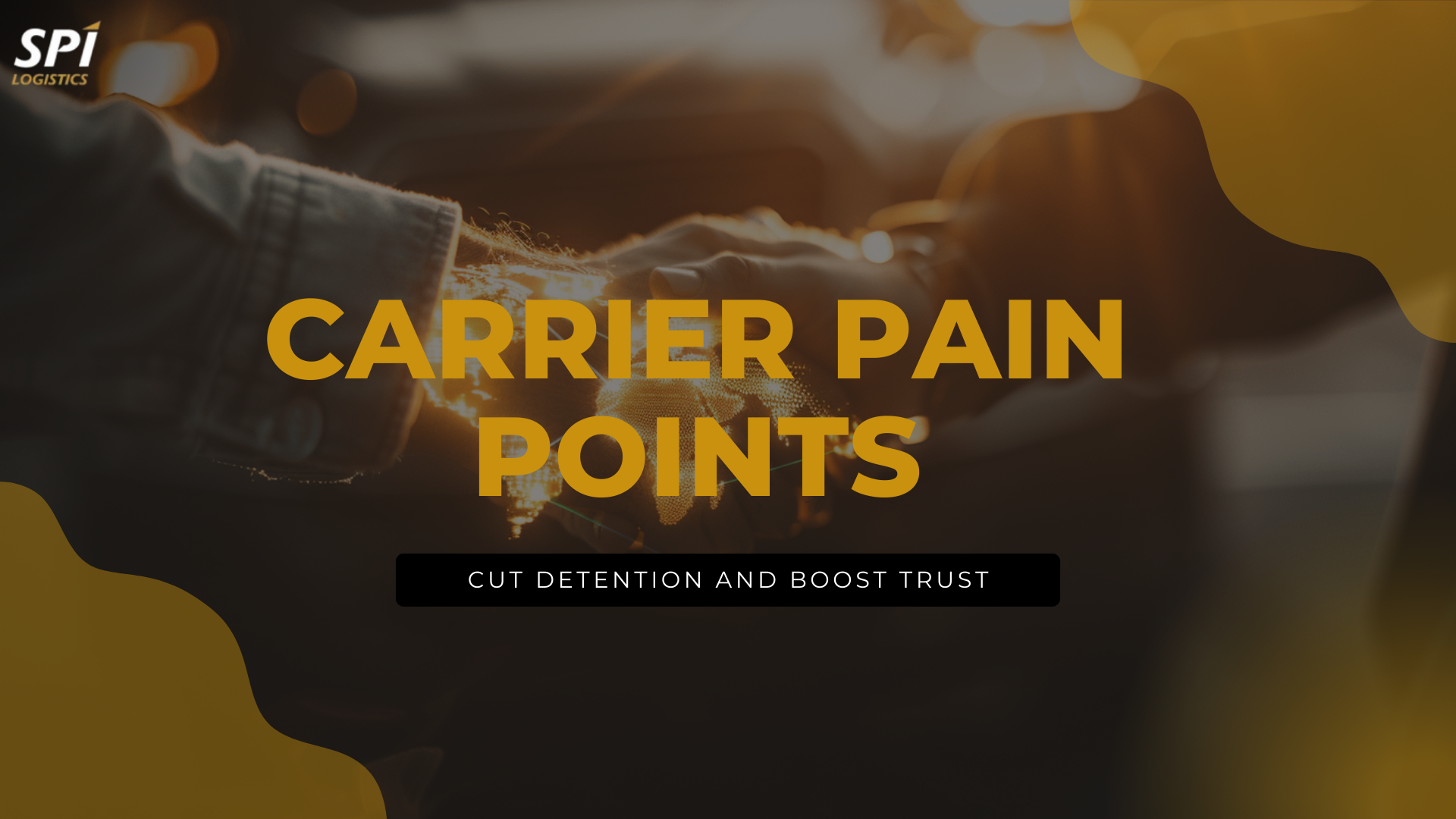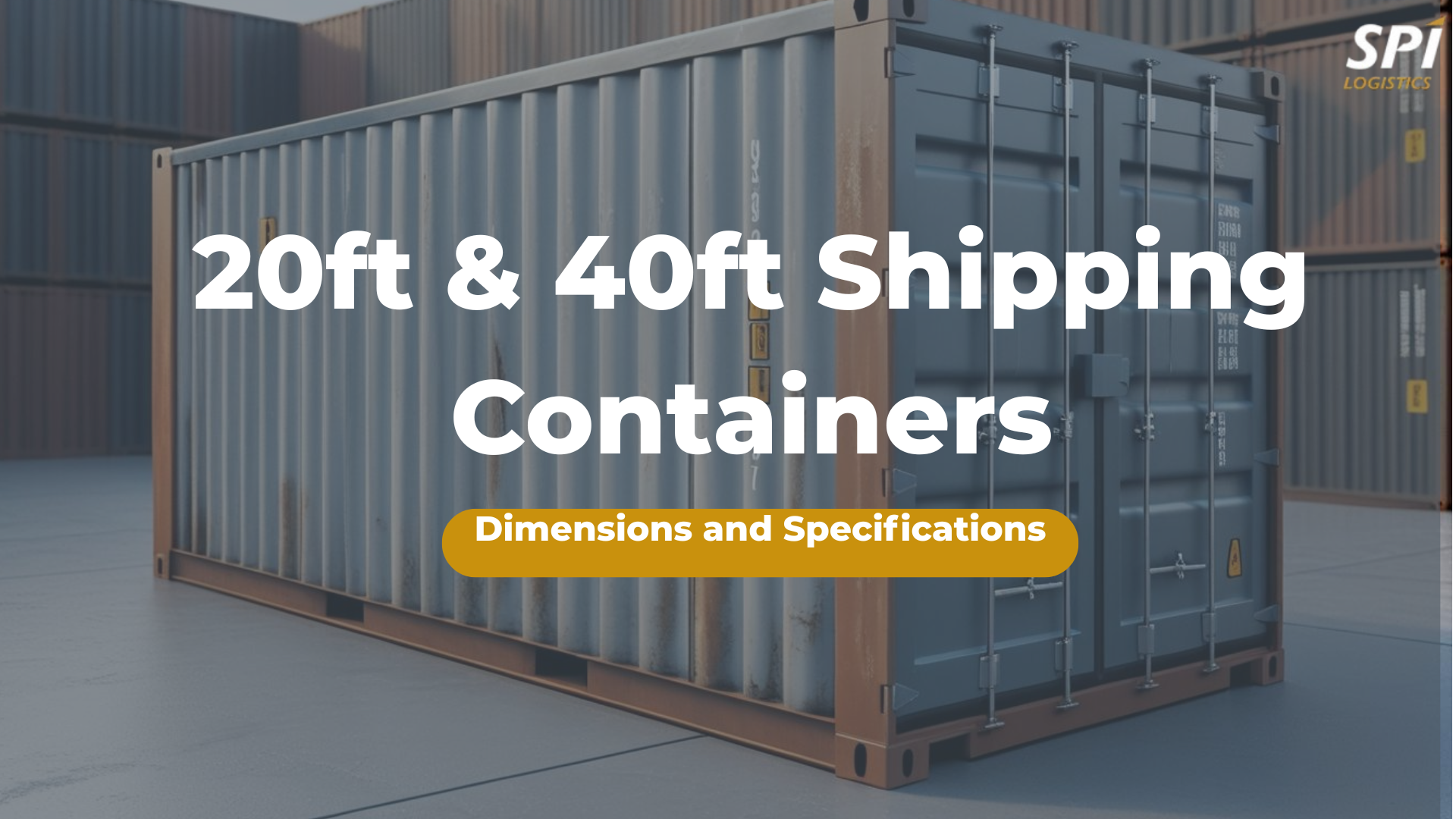The U.S. trucking industry is the backbone of the national economy, moving over 70% of all freight. Whether you’re a logistics professional, aspiring dispatcher, or just exploring opportunities in transportation, understanding the top trucking companies and available dispatcher training can help you gain a serious edge.
In this guide, we’ll break down the top 10 trucking companies in the United States, what sets the biggest trucking companies apart, and the Industry trends these trucking companies follow.
What is the Trucking Business?
The trucking business refers to the industry involved in transporting goods and cargo overland using trucks. It’s a multi-billion dollar sector in the U.S., essential to supply chain operations across retail, manufacturing, food, and more (ATA, 2024). Trucking companies range from small local fleets to massive, nationwide carriers that handle freight coast-to-coast. Most companies fall into one of two categories:
- For-hire carriers: These companies transport goods for other businesses.
- Private carriers: Companies that move their own products, like Walmart’s fleet.
From shipping raw materials to delivering online purchases, trucking is the logistical lifeblood of modern economies.
“The trucking business is no longer just about hauling freight, it’s about managing data, optimizing routes with AI, and adapting to real-time supply chain disruptions.”
How do you think rising fuel costs and driver shortages are shaping the future of the trucking business?
Types of Trucking
Trucking services come in various forms depending on freight type, truck capacity, and operational scale. Here are the most common types:
1. Full Truckload (FTL) – Shipments fill an entire truck. Used for large-volume or high-priority freight.
For example, Amazon may use FTL services to transport pallets of goods from distribution centers to fulfillment hubs.
2. Less-Than-Truckload (LTL) – Several shipments from different customers share a truck. Ideal for small to mid-size businesses.
For example, Companies like FedEx Freight and Old Dominion specialize in LTL services, reducing shipping costs for lower-volume shippers.
3. Refrigerated Trucking (Reefer) – Transports perishable items like food or pharmaceuticals.,
For example, Tyson Foods relies on reefer trucks to move fresh and frozen products across the country.
4. Flatbed Trucking – Used for oversized or oddly-shaped freight such as construction materials or machinery.
For example, a Caterpillar bulldozer might be hauled on a flatbed from factory to job site.
5. Tanker Trucking – Carries liquids or gases, including fuel or chemicals.
Companies like Schneider and Kenan Advantage Group specialize in safely transporting hazardous materials.
6. Expedited Trucking – Time-sensitive delivery with minimal stops. Common in automotive or emergency supply chains.
UPS’s express freight division handles many of these high-priority deliveries (UPS, 2024).
7. Intermodal Trucking – Involves trucks in combination with rail, ship, or air for long-haul freight. J.B. Hunt is a leader in intermodal services, offering eco-friendly and cost-effective shipping solutions through rail partnerships (J.B. Hunt, 2024).
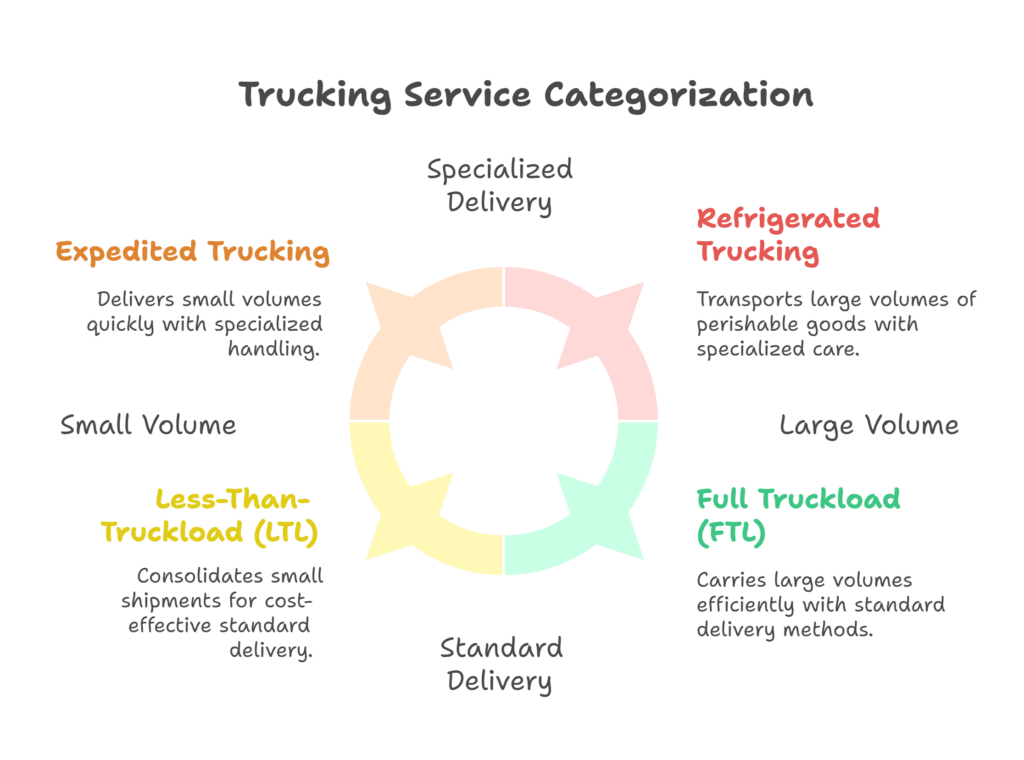
Understanding these categories can help shippers choose the right service, and help new businesses decide their operational niche.
“Choosing the right trucking type depends on more than just cargo, it’s about delivery urgency, risk tolerance, and cost efficiency. A hybrid approach like intermodal can cut emissions and save money.”
Which trucking type do you think will see the most growth in the next five years, and why?
What to Look For in the Biggest Trucking Companies
When evaluating large trucking companies, consider the following metrics:
- Fleet size – Consider the number and type of trucks a company operates.
For example, UPS has over 125,000 vehicles in its ground fleet, allowing for extensive delivery and logistics capabilities (UPS, 2024).
- Number of employees – A larger workforce can indicate robust operations and customer support.
FedEx employs more than 500,000 people globally, enabling it to offer rapid, high-volume logistics services (FedEx, 2024).
- Annual revenue – High revenue signals stability and market dominance.
For instance, Knight-Swift Transportation had an annual revenue exceeding $6 billion in recent years, underscoring its scale.
- Nationwide coverage – National reach is crucial for consistent service.
Companies like XPO Logistics operate across all 50 states, ensuring coverage even in remote areas.
- Freight specialization – Some companies focus on specific types of freight.
For example, Old Dominion Freight Line specializes in less-than-truckload (LTL) freight, while Schneider National offers both refrigerated and bulk transport services (Schneider, n.d.).
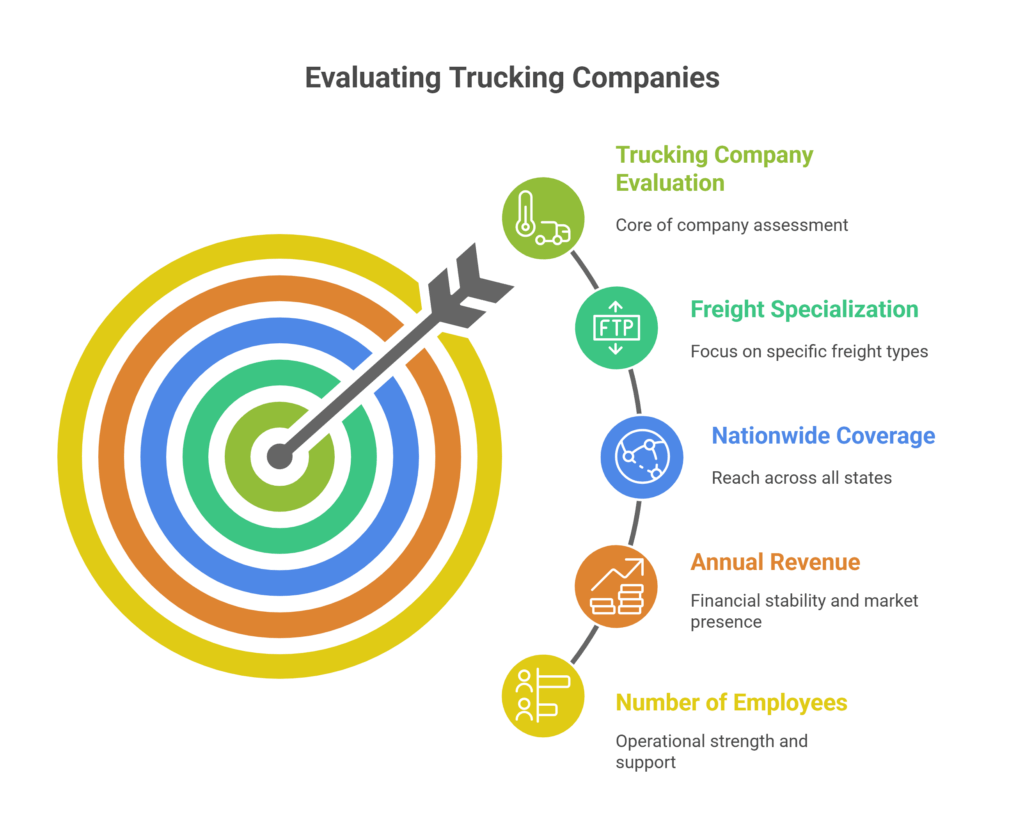
This is why companies like UPS and FedEx repeatedly appear as the largest trucking companies in the United States and even rank among the largest logistics companies globally.
Here’s what separates major trucking companies from smaller players:
- Nationwide coverage (a key strength of nationwide trucking companies)
- Industry certifications and compliance
- Tech adoption (GPS tracking, routing software, fuel efficiency systems)
If you’re a business looking to partner with national trucking companies, the above list should be your first stop.
“Evaluating a top carrier today isn’t just about revenue or fleet size, it’s about safety records, tech platforms, and customer satisfaction. The most innovative companies win repeat business.”
When you’re selecting a trucking partner, which matters more, coverage area, technology, or customer service?
The Top 10 Trucking Companies in the United States
Let’s begin with the top 10 trucking companies in the US. These are the powerhouses moving freight across the country, from coast to coast.
Here are the top 10 trucking companies in the United States:
1. FedEx Freight – As the less-than-truckload (LTL) freight arm of FedEx Corp., FedEx Freight leads the LTL sector in terms of revenue and speed. With a nationwide terminal network and a commitment to overnight delivery options, FedEx Freight supports small businesses and enterprise clients with time-definite solutions (FedEx, 2024).
2. UPS Freight – Now operating as TForce Freight after its acquisition by TFI International, UPS Freight remains a heavyweight in regional and national LTL shipments. It brings the trusted reliability of UPS to freight operations, with advanced tracking and broad service coverage across the U.S (UPS, 2024).
3. XPO Logistics – XPO is one of the largest providers of LTL transportation in North America. Known for investing heavily in technology, XPO uses AI-based route optimization and real-time visibility platforms. Its customer base includes major retail, manufacturing, and e-commerce firms (XPO, n.d.).
4. J.B. Hunt – A leader in intermodal and dedicated trucking services, J.B. Hunt has a strong strategic alliance with BNSF Railway. Its multimodal capabilities and expansive brokerage operations have helped it deliver over $14 billion in annual revenue (J.B. Hunt, 2024).
5. Schneider National – With more than 10,000 company trucks and 180,000 trailers and containers in service, Schneider is a dominant force in both truckload and intermodal freight. It offers dry van, refrigerated, bulk, and brokerage services to clients in retail, industrial, and energy sectors (Schneider, n.d.).
6. Knight-Swift Transportation – After the 2017 merger of Knight Transportation and Swift Transportation, the company became the largest truckload carrier in the U.S. Knight-Swift operates over 19,000 tractors and 58,000 trailers, providing services that include dry van, temperature-controlled, and flatbed (Knight-Swift, n.d.).
7. Old Dominion Freight Line – Recognized for its precision and consistency, Old Dominion is a premium LTL provider with one of the best on-time delivery and claims-free records in the industry. The company continues to outperform many peers in terms of service quality and profitability.
8. Landstar System – A unique asset-light model distinguishes Landstar, which relies on over 10,000 owner-operators and independent agents to provide truckload, LTL, and expedited services. Landstar excels in customized logistics and capacity flexibility.
9. Estes Express Lines – A privately owned freight carrier with deep roots in LTL and time-critical services, Estes is known for customer service and operational flexibility. With over 240 terminals and 10,000 tractors, it ranks among the largest privately held trucking companies.
10. Werner Enterprises – Headquartered in Nebraska, Werner is a top provider of freight transportation and logistics services. It operates a large fleet of more than 8,000 trucks and is known for its innovation in telematics and safety systems, serving clients across North America and Mexico.
These top 10 trucking companies in the US consistently deliver high volumes and rank among the largest trucking companies by revenue and fleet size. Many of them also top the top 5 trucking companies in the USA list every year.
In fact, when you analyze the biggest trucking companies in the USA, you’ll see that many overlap with this list. The data confirms: the biggest trucking company in America often leads with technology, driver support, and delivery coverage.
“The top 10 trucking companies don’t just dominate in size, they lead in innovation, reliability, and nationwide infrastructure.”
Looking to partner with industry leaders for smooth freight delivery? Explore our shipping services and see how we connect shippers with top-performing carriers.
Industry Trends Among the Top 10 Trucking Companies in the US
The top 10 trucking companies in the US are driving the following trends:
- Electric Fleets: Companies like Knight-Swift and Schneider are actively piloting electric semi-trucks as part of their sustainability initiatives. These electric fleets are designed to reduce carbon emissions, lower fuel costs, and position these carriers as leaders in green transportation.
- AI & Telematics: The adoption of artificial intelligence and telematics systems allows for real-time load tracking, predictive maintenance, and smart routing. This technology helps the largest trucking companies in the USA optimize delivery times and reduce operational costs while enhancing transparency for shippers and receivers.
- Driver Incentives: To address the ongoing driver shortage, major players are raising driver pay, offering sign-on bonuses, and improving work-life balance with flexible routes. These incentives not only help attract new drivers but also retain experienced ones in a highly competitive labor market.
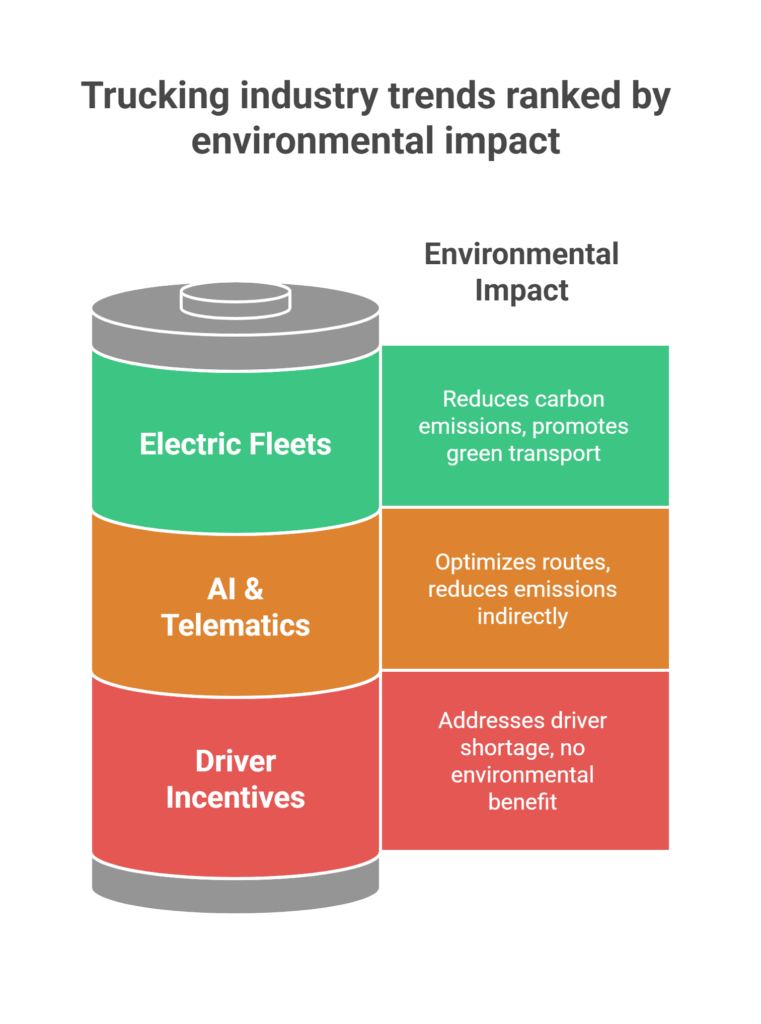
“The biggest trucking company in America doesn’t just own trucks, they’re data-driven logistics engines in motion.”
Looking to stay ahead of industry trends and find solutions tailored for freight brokers? Explore our freight broker solutions.
Frequently Asked Questions (FAQs)
1: What are the top 10 trucking companies in the United States?
UPS, FedEx, J.B. Hunt, XPO, Knight-Swift, Schneider, and more — each offer massive fleets and national reach.
2: What’s the difference between national and major trucking companies?
National companies offer U.S.-wide service, while major companies may focus on regional strength or specialization.
3: Are the largest trucking companies also the most reliable?
Often yes, but smaller players can offer niche services with excellent reliability.
4: Where can I find a trucking companies list?
Industry directories, FMCSA data, and logistics platforms often list top freight and trucking firms.
Start Strong, Think Big
The trucking industry in the United States is a backbone of the national economy, with the top 10 trucking companies in the United States and other largest trucking companies setting the pace through scale, innovation, and reliability. From exploring the types of trucking services to evaluating what makes a logistics partner stand out, understanding this landscape is crucial for making informed decisions. If you’re seeking to work with the biggest trucking companies in the USA, it’s essential to stay informed on trends and best practices. With the right insights, tools, and partners, navigating the freight world becomes not just manageable, but a strategic advantage.
Ready to move freight with confidence? Contact us to connect with top-rated carriers and customized logistics solutions that fit your needs.
References
American Trucking Associations (ATA). (2024). ATA Trends & Statistics. Discover more
UPS. (2024). Investor Relations – Company Overview. Discover more
FedEx. (2024). Annual Report & Company Profile. Discover more
J.B. Hunt Transport Services. (2024). Intermodal Leadership & Sustainability. Discover more
Knight-Swift. (n.d.). Company overview. Retrieved from Discover more
Schneider. (n.d.). Why Schneider. Retrieved from Discover more
XPO. (n.d.). LTL transformation. Retrieved from Discover more


